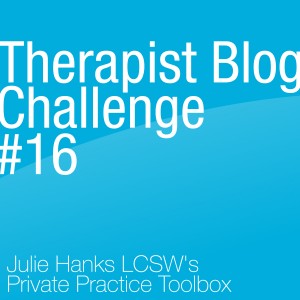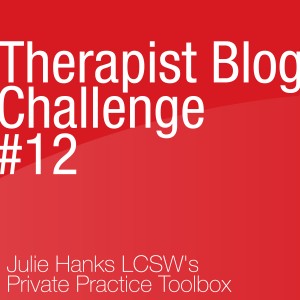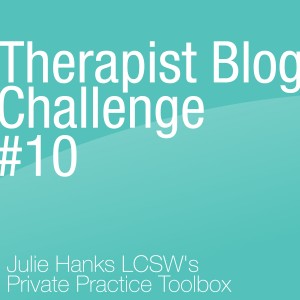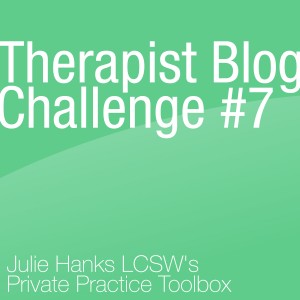 Therapist blog challenge #16 focuses on how to help readers make it through the crazy emotional stress of the holiday season.
Therapist blog challenge #16 focuses on how to help readers make it through the crazy emotional stress of the holiday season.
[Headline] Come up with a catchy title for your blog post. Here are a few examples:
Crazy Christmas and Hectic Hanukkah! How to Make it Through the Holidays
How to Survive Holiday Chaos and Have Fun with The Family
Dealing with Holiday Stress: Tips to Get You Through
[Strong Intro] Lay out the topic with a little more detail. Below is an example.
The holidays are upon us! Time to deck the halls, eat delicious food, and spend time with the family. And while 'tis the season to be jolly, experience tells us that not every moment will be perfect. Stress levels and emotions can run high, and our mental sanity can take a hit. Here are strategies to deal with holiday chaos and actually enjoy the season:
[Scanable Content]
Break your content into smaller, readable sections with a clear sub-heading.
Anticipate Some Stress
 If you are expecting absolute perfection, you will be let down. Prepare for the holiday vacation knowing that there is going to be some stress involved. Your in-law might offend you, the kitchen will be a mess, you might get overwhelmed with all there is to do, etc. By understanding that things will be hectic at times, you can have realistic expectations and prepare to deal with such moments. This is not to suggest that you should set yourself up for a miserable, anxiety-filled family vacation. On the contrary, by anticipating some stressful moments, you'll be more able to savor the good ones.
If you are expecting absolute perfection, you will be let down. Prepare for the holiday vacation knowing that there is going to be some stress involved. Your in-law might offend you, the kitchen will be a mess, you might get overwhelmed with all there is to do, etc. By understanding that things will be hectic at times, you can have realistic expectations and prepare to deal with such moments. This is not to suggest that you should set yourself up for a miserable, anxiety-filled family vacation. On the contrary, by anticipating some stressful moments, you'll be more able to savor the good ones.
Don't Schedule Every Minute
It's exciting to plan a fun-filled vacation, but if you find yourself or others constantly worn out from the non-stop skiing, baking, or outings, take a step back from all the activities. Sleep is valuable for everyone, so amidst the holiday partying, make efforts to meet the needs of your physical body. Instead of going out to a movie, why not watch one at home so the little kids can start to unwind before bed? Consider lightening up the calendar a little bit.
Plan for Alone Time
If you're married, single, or in a relationship, take time away from the family crowd to refresh. This may mean going for a jog, scheduling a quick date, or doing anything that lets you relax and be yourself. It will be a nice break from the hustle and bustle of the family party and can rejuvenate you to spend more time with them.
Decide to Be Happy
Even if you're stressed, even if you're tired, even if there's some family tension, decide to be your best self. A negative attitude is contagious, and no one likes a party-pooper! On the contrary, a positive outlook is infectious as well, so send out good vibes to others who may be feeling the holiday stress as well. It's likely that you get to be with large groups of family only every so often, so make the most of that time.
[Strong ending paragraph] The final paragraph wraps up your post and can include a summary of important points.
Remember that the holidays are meant to be an enjoyable time with loved ones, not a torturous event. By having realistic expectations, practicing self-care, and taking things easy, you can enjoy the holiday season. How do YOU handle holiday stress?
Now get to writing!
Additional reminders about the 2014 blog challenge
- Write and post your blog article in the next 2 weeks. If you miss the deadline or you read this article months later, that’s OK too. Post a link for this blog challenge in the comment section of this blog post.
- Read, comment, and share other therapist’s articles.
- Tweet your post using hashtag #therapistblog and tag @julie_hanks so I can retweet it.
- Pin it on the challenge Pinterest Board. I’ve invited everyone who posted a comment on the initial blog challenge post as collaborators so you can pin onto the group board.
- Spread the word and invite mental health colleagues to join the challenge. Articles can be added anytime throughout the year.
- Write no more than 600 words, make it easy to read, use a conversational tone, and gear your articles toward your ideal client (not other professionals).
- The goal of a professional blog is to provide value to your website visitors, help them get to know your professional perspective, increase traffic to your private practice website, and build your practice.
Join my Private Practice Toolbox Facebook group and connect with 2800 therapists around the globe in 2 simple steps: 1) Click request to join the group and 2) Fill out this brief questionnaire before you'll be added to the group.Get practice tips and blog updates in your inbox.








As healers, we genuinely like to do our work. Guiding clients through the therapy process and seeing them make progress is why we do what we do. But if you're in private practice, you know there's a lot going on in the back end and that it's crucial to run an efficient and organized business.